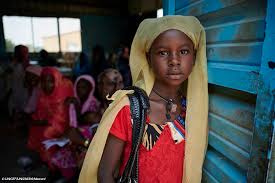By Ikenna Osuoha, News Agency of Nigeria (NAN)
According to United Nations Children’s Fund (UNICEF), Female Genital Mutilation (FGM) refers to all procedures involving partial or total removal of the female external genitalia or other injury to the female genital organs for non-medical reasons.
Over the years it has been practised in many of Nigeria communities, especially the South-East, South-South and South-West.
Critics of the practice say that it is embedded in ignorance and misrepresentation of culture.
Ms Karima Bungudu, Gender/FGM Analyst, UN Population Fund (UNFPA), says the practice constitutes human rights violation.
She described it as the height of gender inequality occasioned by conspicuous discrimination against the female gender.
The UNFPA FGM Analyst wondered why women could be singled out for such harmful practice thereby stifling their potential to live life to the fullest.
“FGM is an infringement on the girl’s right to health, hence its health complications can retard the girl’s vision and dreams for greater future.
“It is a violation of the girl’s or woman’s human rights to choices and self-preservation,” she said at training for media professionals on FGM.
Bungudu said it was unfortunate that `the cruel practice by social, cultural and gender inequitable norms and belief`, had been normalised.
She said the risk and complications increase with the type of FGM and may likely be more severe and prevalent with infibulations.
Experts say infibulation involves the narrowing of the vaginal opening through the creation of a covering seal.
According to them the seal is formed by cutting and repositioning the labia minora, or labia majora, sometimes through stitching.
According to the UN agency, majority of the 800,000 people who die by suicide every year are young people.
It stated that self-harm was the third leading cause of death among 15 to 19-year-olds, with higher rates among adolescent girls.
“It is estimated that globally one in four children live with a parent who has a mental disorder.
“For children experiencing violence, neglect or abuse at home, lockdowns have left many stranded with abusers and without the support of teachers, extended families and communities.
Children in vulnerable population groups, such as those living and working on the streets, children with disabilities, and children living in conflict settings, risk having their mental health needs overlooked entirely,” the report said.
To make matters worse, the pandemic has disrupted or halted critical mental health services in 93 per cent of countries worldwide, according to the World Health Organisation (WHO).
This, WHO said, is amid a surge in demands for mental health support globally.
To address the challenge, the UNICEF boss urged countries to invest in expansion of mental health services and support for young people and their caregivers in communities and schools.
“We also need scaled-up parenting programmes to ensure that children from vulnerable families get the support and protection they need at home,” Fore said.(NAN)



